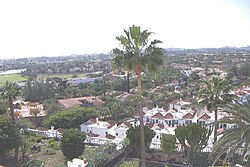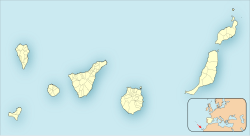Maspalomas
| Maspalomas | |
|---|---|
| Town | |
 |
|
| Location in Canary Islands | |
| Coordinates: 27°46′N 15°35′W / 27.767°N 15.583°WCoordinates: 27°46′N 15°35′W / 27.767°N 15.583°W | |
| Country | Spain |
| Autonomous community | Canary Islands |
| Province | Las Palmas |
| Municipality | San Bartolomé de Tirajana |
| Population (2013) | |
| • Total | 36,065 |
| Postal code | 35290 |
Maspalomas (/ˌmɑːspəˈlɒməs/, Spanish: [maspaˈlomas], locally: [mahpaˈlomah]) is a tourist town in the south of the island of Gran Canaria, Canary Islands, stretching from Bahía Feliz in the east to Meloneras in the west, including the resort towns of San Agustín and Playa del Inglés. Maspalomas constitutes the southernmost part of the municipality of San Bartolomé de Tirajana.
Before the era of tourism, Maspalomas was the name of a hamlet in what today is San Fernando de Maspalomas. Its name may derive from that of Rodrigo Mas de Palomar, a settler and soldier from Majorca, or from Francisco Palomar, a Genoese friend of Alonso Fernandez de Lugo who purchased 87 Guanche slaves from Güímar and settled in the area.
Present-day Maspalomas is the result of an ambitious development project, organized in the form of an International Ideas Contest (opened to any member of the International Union of Architects), held in 1961 under the auspice of Alejandro del Castillo, owner and promoter of most of the space under construction. The contest was won by the French office SETAP (including the urbanist Guy Lagneau and the economist Michel Weill) and covered the 1,060 hectares (2,600 acres) and 19 kilometres (12 mi) of coast that constitute the core area of Maspalomas - Costa Canaria. The contest paved the way for a particular way of understanding "touristic" urbanism that served as model for later tourists developments in other Canary Islands.
...
Wikipedia

